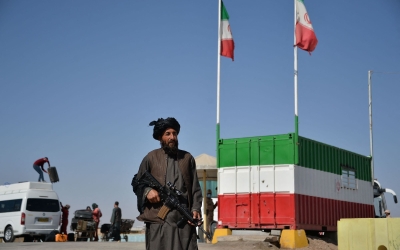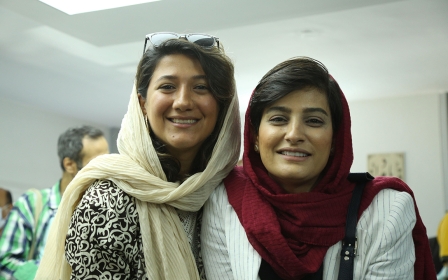Iranian press review: Arrests and sackings over 'unveiled' marriage proposal

Arrests and sackings over 'unveiled' marriage proposal
A public marriage proposal in a tourist site in the Iranian city of Shiraz has led to the arrest of the engaged couple and the sacking of local officials.
On Monday, a video began circulating on Farsi social media showing a man proposing to a woman not wearing a headscarf at the tomb of the famous 14th-century poet Hafez-e Shirazi, known as the "poet of love and wine".
According to local media, the judicial system filed a lawsuit against the couple, accusing them of "acting against the Sharia law" and "unveiling in public".
Two managers of the Hafezieh historical centre were also arrested, and the provincial director of the Ministry of Cultural Heritage and Tourism in the Fars province was also suspended from work.
New MEE newsletter: Jerusalem Dispatch
Sign up to get the latest insights and analysis on Israel-Palestine, alongside Turkey Unpacked and other MEE newsletters
The Tasnim news agency, which is affiliated with the Islamic Revolutionary Guard Corps (IRGC), reported that the Fars province governor had said he would "decisively respond" to any move against the Islamic Sharia law.
"By no means will we allow any behaviour against the norm and Sharia to occur in Shiraz and the Fars province. On the contrary, we will prosecute all those who have been organised to spread moral corruption and depravity," Tasnim quoted Mohammad Hadi Eimanieh as saying.
Exiled opposition lambasts prison swap between Tehran and Brussels
A prisoner swap between Iran and Belgium, facilitated by Oman, has sparked anger amongst Iranian opposition figures living in exile, who accused western powers of "hypocrisy and double standards".
On Friday, Tehran freed aid worker Olivier Vandecasteele in return for the release of diplomat Assadollah Assadi who was convicted of planning a thwarted bomb attack on an exiled opposition groups in France.
After Assadi's conviction, Iranian security forces arrested Vandecasteele and gave him a 40-year prison sentence based on espionage charges. Vandecasteele and Belgian officials reject the charges.
But while western diplomats welcomed the exchange, the Iranian opposition lambasted it as negotiating with "terrorists".
Vahid Beheshti, an Iranian activist in the UK, wrote on Twitter: "Belgium has released the terrorist disguised as a diplomat, Assadollah Assadi, who had used his diplomatic immunity and smuggled explosives to plot a terror attack in Paris."
"Another deeply shameful decision by the West, when holding terrorists accountable must be our priority," added Beheshti, who, this year, went on a 73-day hunger strike outside the UK's Foreign, Commonwealth and Development Office, demanding the IRGC be branded as a terrorist organisation.
Meanwhile, Iranian journalist Sima Sabet warned western countries about the consequences of such deals with the Iranian government.
"No country will have long-term peace and security when allowing foreign agents to operate freely on its [soil]! For sure, compromising with state terrorist activities is like playing with a boomerang! It will come back to you sooner or later," she wrote on Twitter.
Iranians demand military response to Taliban
Following clashes on the Iranian-Afghanistan border on Sunday that left two Iranian border guards dead, some in the country have demanded the government use military force to stop further attacks by the Taliban.
Since the Taliban's return to power in Afghanistan, several skirmishes have occurred on the Iran-Afghanistan border.
However, the Iranian government has downplayed their significance.
On 28 May, the front pages of most Farsi dailies were covered with photos of the latest clashes between the forces of the two countries, and the Arman Emrouz newspaper urged the government to demonstrate Iran's defensive power to the Taliban.
"The Islamic Republic of Iran must have a solid reaction to the Taliban actions… it is now necessary to show the power of Iran's defence system to the Taliban; the system that Israel and the West are afraid of," wrote the daily.
In an interview with the Etemad daily, Abdulmohamad Taheri, Iran's former cultural attache in Afghanistan, criticised President Ebrahim Raisi's administration for their policies toward the Taliban.
"We have not demonstrated a strict approach to them. All we did was give them some services and welcome their return to our borders because the US left our neighbouring country," Etemad quoted Taheri as saying.
Conservative ayatollah compares hijab law with Berlin Wall
At last week's Friday prayer, the supreme leader's representative in the Alborz province drew a comparison between defying the country's strict hijab law and the fall of the Berlin Wall in Germany, criticising the draft of a new bill sent to the parliament to update the law.
"Considering the enemies' plans, this bill cannot prevent the fall of the Berlin Wall, however before scrutinising the draft in the parliament, we should not judge it," Iran's official news agency IRNA quoted Ayatollah Seyyed Mohammad Mehdi Hosseini Hamedani as saying.
The conservative cleric stressed that sending warnings and fines would not stop women from defying the hijab law.
"Today, we are under the enemies' chemical attack, and they are spreading nerve gases in our society by encouraging women to remove their veils. Can we confront this unrestrainedness with just a few warnings and text messages?" he added.
According to the new bill, women who remove their hijab in public would first receive a warning text message. If they were caught on city cameras for a second time, they would be fined, and after that, they would be deprived of social services.
*Iranian press review is a digest of news reports not independently verified as accurate by Middle East Eye.
Middle East Eye delivers independent and unrivalled coverage and analysis of the Middle East, North Africa and beyond. To learn more about republishing this content and the associated fees, please fill out this form. More about MEE can be found here.





